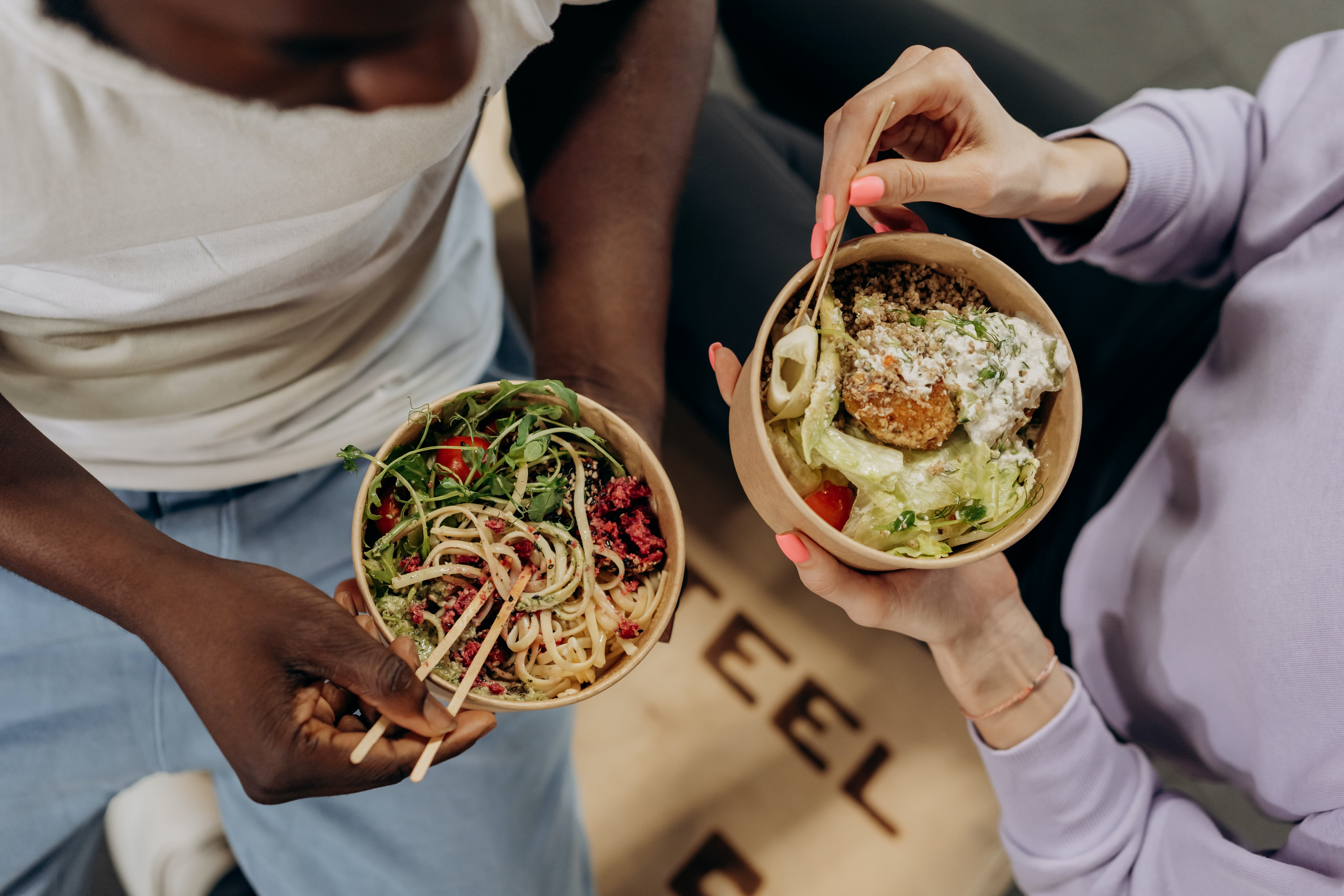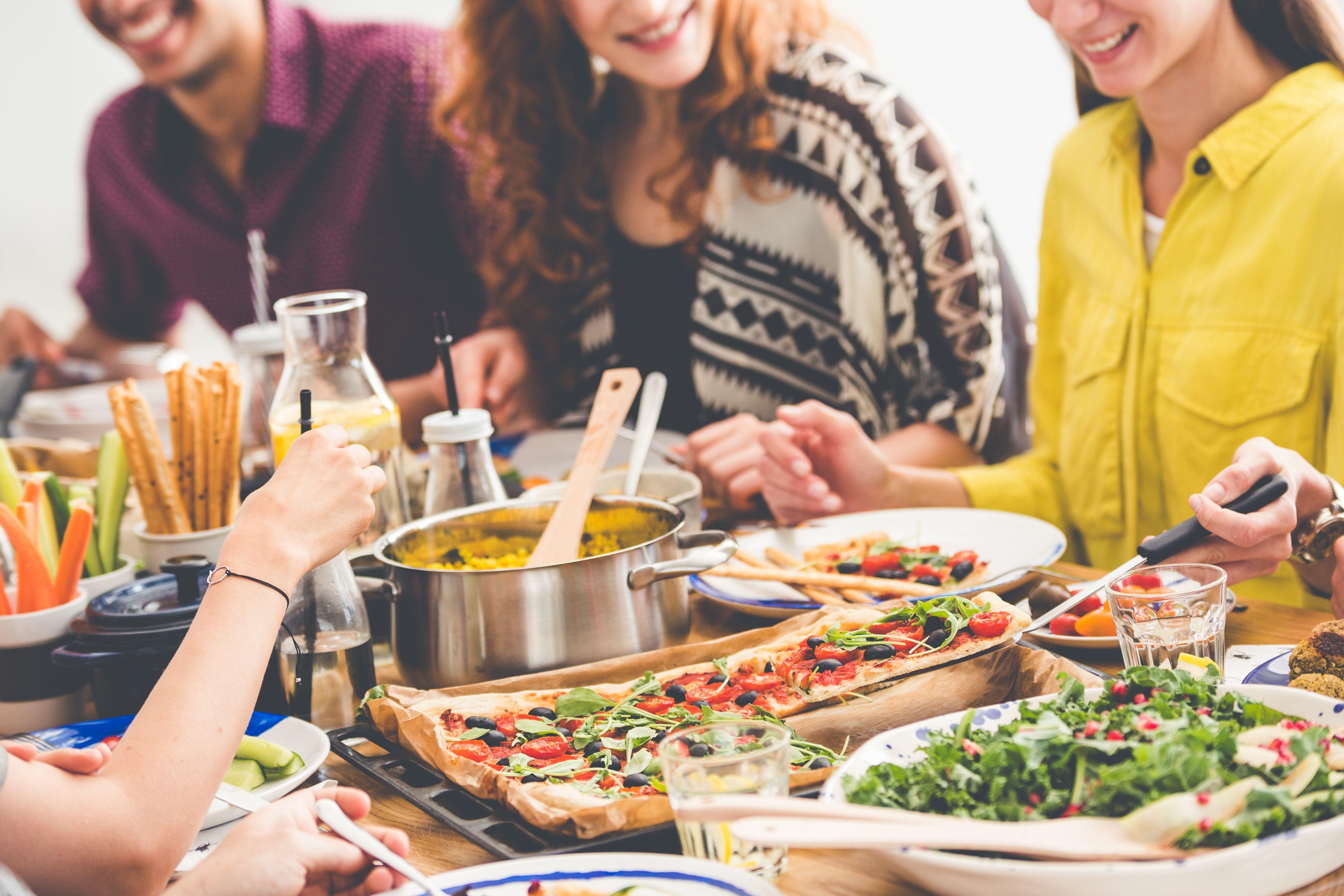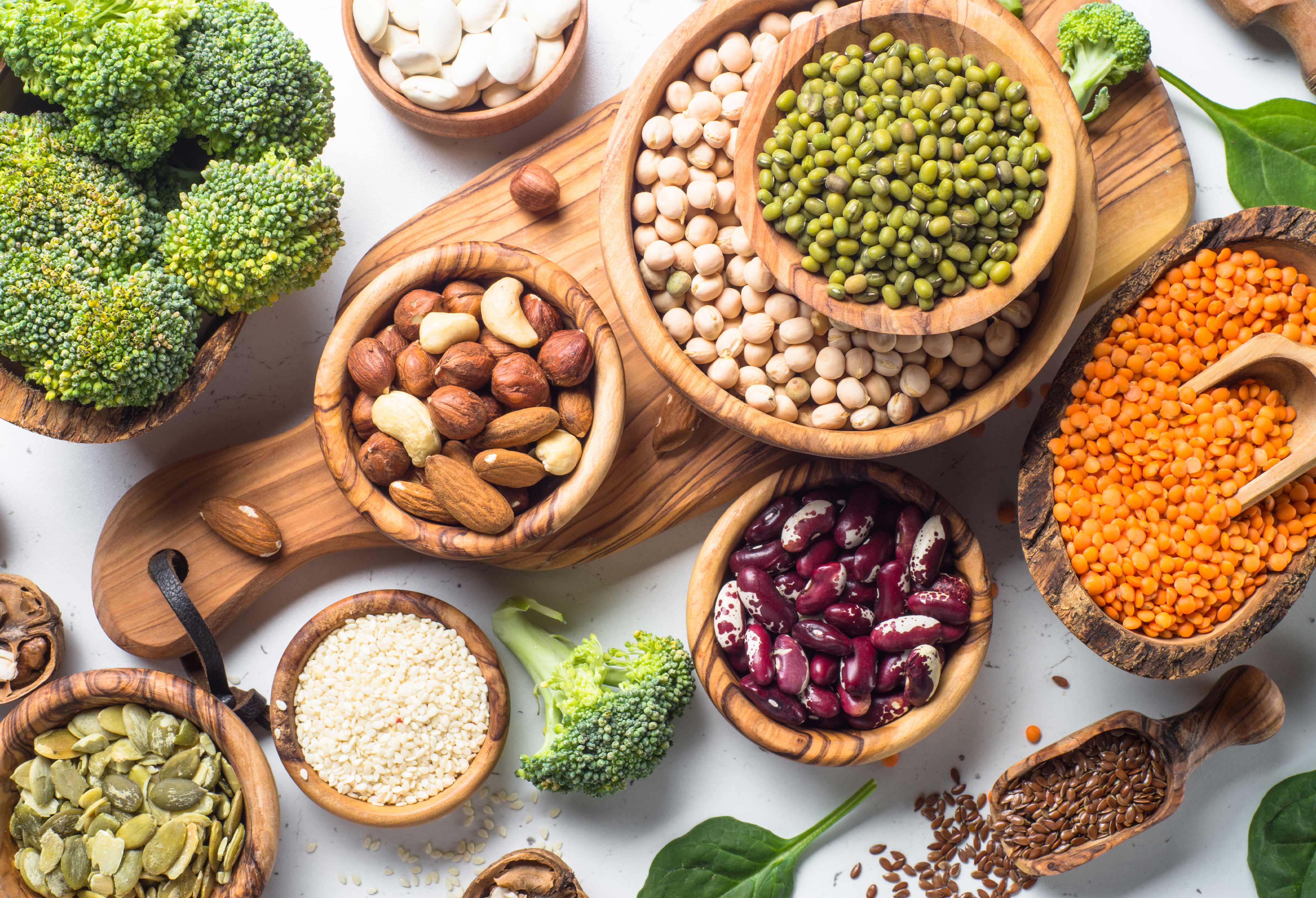




Choosing to go plant-based can be one of the best things you do for animals, for your health, and for the environment. And we’re here to help you do it.

A plant-based diet isn’t restrictive, as most “diets” tend to be. It’s actually a chance to explore all the delicious meals you can create while causing as little harm as possible to your body, to animals, and to the planet. But, as with any new adventure, it can be tricky to know where to start! Is “plant-based” different from “vegan” or “vegetarian?” Do you have to cut out animal products entirely? In this free Plant-Based Starter Guide, we’re here to help answer all those questions—and more.
What is a plant-based diet?
The first thing to know about a plant-based diet is this: It’s a diet centered around plants. Rather than focusing on what you can’t eat, a plant-based diet focuses on what you can—all the nourishing, flavorful, colorful foods that grow from the soil! As you’re embarking on this new journey, remember that the point of a plant-based diet isn’t to limit or restrict yourself. It’s to explore new possibilities for what you put on your plate, all in service of a healthier, happier, and more compassionate world.
There are a few different ways to make the transition. One option is to focus on incorporating more plant-based foods into your diet, like veggies, whole grains, and legumes. As you increase your consumption of plants—building meals around plant sources—you’ll find that you naturally reduce your consumption of meat, dairy, and eggs. Or (and this is easiest for some people) you can focus on cutting out all animal products entirely. There’s no “right” way to go plant-based—the best way to do it is the way that’s easiest and most sustainable for you.
One important thing to remember is that plant-based diets aren’t new. Around the world, people have eaten plant-based for millennia. While the term “vegan” only arose in the 1940s, communities in India, West Africa, the Mediterranean, and elsewhere have been eating primarily plant-based diets for centuries. Religions centered around nonviolence, such as Jainism and Hinduism, have also been influential in reducing consumption of animal products. In a 2021 survey, about four in ten adults in India described themselves as vegetarian.
There’s also a misconception that white people are more likely to be vegan—which is far from the truth! Veganism has a thriving presence and history in communities of color; in 2020, people of color in America were more likely to say they’d reduced their meat consumption than white Americans. Understanding the varied, far-reaching roots of veganism is essential as we work to build a strong, resilient, and intersectional movement together.
What is a whole-food, plant-based diet?
“Whole foods” refer to foods that are as whole and unprocessed as possible. Think of an apple, for example, which you can pick right off the tree. While there are some amazing vegan meats, snacks, and “junk” foods out there (and these are great in moderation!), to truly reap the health benefits of a plant-based diet, you’ll want to enjoy as many whole foods as you can. That means centering your meals around the five essential food groups.
The five essential food groups
To build a well-balanced meal, try to include each of the following categories:
- Fruits and vegetables: A good rule to live by is that you can never eat too many veggies! (Seriously. You can’t.) Try to incorporate at least one fruit or veggie into every meal—with the recipes we’ll share below, it’s easier than you think.
- Whole grains: Whether it’s oatmeal topped with fruit, a satisfying sandwich on whole-grain bread, or a flavorful rice bowl, grains make a fantastic (and filling) base for breakfast, lunch, and dinner.
- Nuts and seeds: These nutritional powerhouses aren’t just for snacking—they’ll give any meal a boost of flavor, texture, and healthfulness. Try adding walnuts to a salad, sprinkling pumpkin seeds on avocado toast, or mixing pistachios into a stir-fry.
- Legumes: Beans, lentils, chickpeas! Packed with protein and essential nutrients, legumes will keep your belly full and your body nourished.
- Healthy fats: From avocados to olive oil, omega-3 fats are delicious, nutritious, and essential for healthy brain function. As a bonus, they make every meal rich and satisfying. Spread avocado on a sandwich instead of mayonnaise, add flax seeds to a smoothie, or drizzle olive oil over a pasta dish.
How to start a plant-based diet
So how do you actually get started? Here are some of our best tips for how to begin—and stick to—a plant-based diet.
Supplement with B12
This one’s a must! While you’ll get plenty of protein, iron, and other essential nutrients from a vegan diet, B12 is the only one that can be difficult to get from plant-based sources alone. To ensure you have plenty of energy, we recommend taking a B12 supplement. (Try these drops, this raspberry spray, or these yummy vegan cranberry gummies!)
Try Meatless Mondays
If going 100% plant-based feels overwhelming at the start, try doing it just one day of the week—like Monday! The Meatless Mondays campaign offers a supportive community, a sense of accountability, and plenty of resources to help you. As you explore new meals and recipes, you might be able to gradually begin eating vegan other days of the week, too.
Explore plant-based proteins
When you’re used to creating meals around an animal-based protein (like a hamburger, sandwich meat, or scrambled eggs), it might seem challenging to switch up your routine. Never fear—there are plant-based versions of all those foods! Plant-based meats can be a convenient way to reduce your meat consumption while still enjoying the familiar foods you’re used to.
Don’t replace one meat with another
Many well-meaning people opt for an egg-heavy vegetarian diet, or replace their red meat consumption with chicken or fish. Unfortunately, this can end up harming animals more than it helps. Not only does it take many more chicken lives to feed the same number of people as a single cow (chickens now account for 9 in 10 land animals raised for food globally), but chickens also suffer the worst abuses of any farmed animal. To make the most positive impact, try cutting back on all animal products equally, rather than swapping one for another.
Indulge your cravings
Most importantly, the key to sticking with a plant-based diet is to make sure you enjoy your meals. If you’re craving meat-based “comfort food,” you might just be craving something rich, salty, and indulgent—and there are plenty of vegan meals to satisfy that craving! Check out our Comforting Chickenless Cookbook, chock-full of recipes to soothe body and soul.
3-day plant-based meal plan
Ready to give plants a try? Here’s a sample 3-day meal plan to get you started!
Plant-based diet recipes
Day 1
- Breakfast: Chai porridge with caramelized apples
- Lunch: Chickpea “tuna” sandwich
- Dinner: Mushroom stroganoff
- Dessert: Chai raspberry cupcakes
Day 2
- Breakfast: Green banana smoothie
- Lunch: Veggie burger and fries
- Dinner: Pasta with marinara sauce
Day 3
- Breakfast: Peanut butter and raspberry chia jam crepes
- Lunch: BBQ pizza
- Dinner: Lentil lasagna soup
- Dessert: Lemon poppyseed cake
Vegan grocery list
One cool thing about many vegan foods—pasta, canned chili, dried legumes—is that they’re affordable and shelf-stable. To make your plant-based transition as easy (and budget-friendly) as possible, we’d recommend filling your pantry with the following staples, which you’ll be able to use over and over in plenty of meals. That way, you can just shop for produce each week! Bring this list to the grocery store to use as a guide.
PACK YOUR PANTRY:
- Grains: Pasta, brown rice, quinoa, couscous, farro, buckwheat, oats, rice noodles
- Canned foods: Vegan chili, pasta sauce, salsa, vegan soups, dried seaweed
- Legumes: Kidney beans, black beans, peas, chickpeas, lentils
- Nuts & seeds: Chia, hemp, sunflower, pumpkin, and flax seeds; almonds, walnuts, and cashews
- Root vegetables: Sweet potatoes, parsnips, potatoes, onions, garlic
- Snacks: Popcorn, tortilla chips, dried fruit, trail mix, vegan cookies and crackers
- Sauces & dressings: Extra-virgin olive oil, nut butters, vinegars, hot sauce
FILL YOUR FRIDGE:
- Vegetables: Dark leafy greens (spinach, kale, collards), broccoli, green beans, peppers, carrots, Brussels sprouts, tomatoes, avocados
- Fruits: Apples, citrus fruits, bananas, berries
- Plant-based alternatives: Tofu, hummus, tempeh, falafel, seitan, vegan meats, plant-based milks, vegan butter, vegan cheeses
- Frozen foods: Fruits and veggies, frozen meals, vegan desserts
Benefits of a plant-based diet
Is all this sounding pretty good so far? It’s only going to get better. From your first meal to your first year, here are some of the positive impacts you can expect from your plant-centric diet.
Improve the lives of animals
By transitioning to veganism, the most direct impact you’ll have is on the animals.
The average American eats about 25 land animals per year (and that isn’t even including fish, or “bycatch,” the animals accidentally killed as a result of fishing). This demand for animal products means that billions of sensitive chickens, beautiful cows, and intelligent pigs spend their entire lives suffering on factory farms. But it doesn’t have to be this way.
By refusing to eat animal products, you’re sending a powerful message that reverberates through the food supply chain. Think about it: Just a few years ago, restaurants rarely had vegan options. Now, some of the biggest chains (Burger King, Kentucky Fried Chicken, and more) have plants on the menu. Every purchase decision influences demand, which ultimately impacts supply—resulting in fewer animals being raised to suffer on factory farms.
Your plant-based diet is a way to revoke support for an institution that trades suffering for profit. It’s a vote for a food system that relies on healthy plants rather than on sentient beings. And it’s literally life-changing for each individual animal who is spared by your compassionate decision.
Help fight climate change
Study after study consistently shows that going vegan is one of the most impactful things you can do to reduce your individual impact on the planet. While it’s easy to feel powerless in the face of climate change, the science shows that we can make a difference. Project Drawdown, for example, has led vast data collection and used complex mathematical modeling to find the most impactful climate solutions out there. Their analysis shows that individual and household actions have the potential to produce nearly one-third of the total reductions in greenhouse gas emissions that we need to avoid dangerous climate change. That’s huge! And guess what’s listed as one of the highest-impact actions you can take? Eating a plant-rich diet.
Own your power. Eat more plants!
Support your health
Lucky for you, the foods that are better for animals and the environment—whole grains, veggies, fruits, legumes—are also better for your own health. (It’s almost like a plant-based diet is a no-brainer.) Here are some of the health benefits you can expect:
- Reduced risk of heart disease: As the leading cause of death in the United States, cardiovascular disease affects countless individuals and families. But there are ways to help reduce your risk. In 2019, a review of 99 different studies found that a whole-food, plant-based diet is associated with a significantly lower risk of the disease—and can even help reverse it.
- Reduced risk of type-2 diabetes: Eating whole plant foods can also reduce the risk of type-2 diabetes, and can lead to better outcomes for those already fighting the disease.
- A healthier brain: A 2022 study found that sticking to a plant-based diet “was related to better performance on all cognitive tasks.”
Save money
You might also find that your new plant-based diet saves you money at the grocery store. A study published in The Lancet Planetary Health, which analyzed the relative costs of different diets, found that vegan diets were the most affordable way to eat in high-income countries, reducing food costs by 21-34%. And this year, while meat and eggs have led the charge on rising costs at the supermarket, the prices of plant-based items like veggies, bread, and legumes have actually risen slower than the overall rate of inflation for groceries.
Your questions, answered
Can you eat eggs on a plant-based diet?
There’s a common misconception that eggs are cruelty-free. Unfortunately, this couldn’t be further from the truth. The egg industry is responsible for some of the very worst abuses suffered by chickens—among them, confining hens to brutal battery cages, grinding baby chicks alive, and forcing hens to produce more eggs by subjecting them to long periods of starvation. With so many delicious sources of plant-based protein out there (free from the cruelty and the cholesterol), it’s best to leave eggs off your plate.
What happens to your body when you start a plant-based diet?
Because healthy plant-based diets are high in fiber, they come with a whole host of benefits. You might notice improved energy levels, healthier-looking skin, and even better sleep. If you feel any dips in your energy levels after starting a plant-based diet, make sure you’re getting enough healthy calories and supplementing with B12.
Do doctors recommend a plant-based diet?
This one gets a resounding yes! A large (and growing!) body of evidence shows just how powerful a vegan diet can be for improving energy levels, reducing the risk of chronic disease, and even living longer. According to researchers:
Research shows that plant-based diets are cost-effective, low-risk interventions that may lower body mass index, blood pressure, HbA1C, and cholesterol levels. They may also reduce the number of medications needed to treat chronic diseases and lower ischemic heart disease mortality rates. Physicians should consider recommending a plant-based diet to all their patients, especially those with high blood pressure, diabetes, cardiovascular disease, or obesity.
What are the negatives of a plant-based diet?
As with any diet out there, a vegan diet can be unhealthy—after all, fries, potato chips, and many sugary snacks are vegan! Make sure to give your body the nourishment it needs to thrive. If you’re eating plenty of fruits, veggies, whole grains, and plant-based proteins, your vegan diet should only bring you positive results.
Choosing a better way to eat, together
Perhaps the most important thing to know about starting a plant-based diet is that you’re never doing it alone. Even if you don’t know any other vegans right now, there are lots of ways to meet fellow plant-based eaters—whether by joining a Facebook group, attending a Meetup, or even volunteering with us at THL!
For more information, guidance, and recipes to support you in your plant-based journey, download our Free Plant-Based Starter Guide. We’re so excited to be walking this path with you!





